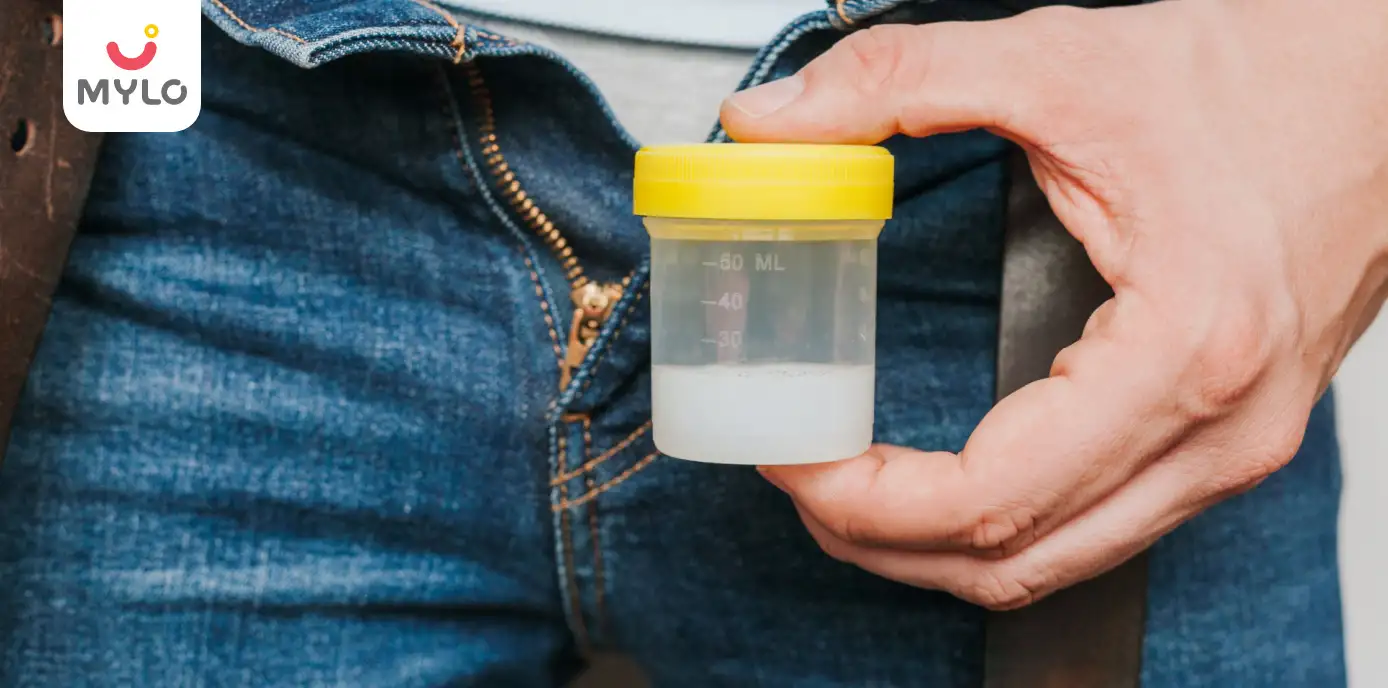Get MYLO APP
Install Mylo app Now and unlock new features
💰 Extra 20% OFF on 1st purchase
🥗 Get Diet Chart for your little one
📈 Track your baby’s growth
👩⚕️ Get daily tips

OR


Article Continues below advertisement
- Home

- Do Antibiotics Affect Fertility: Debunking Common Myths and Misconceptions
In this Article
- Do Antibiotics Affect Fertility?
- What Does Prolonged Use Mean?
- Do Antibiotics Affect Fertility in Females?
- Do Antibiotics Impact Fertility in Males?
- When Can You Try to Conceive After Taking Antibiotics?
- How to Prevent the Harmful Impact of Antibiotics?
- To sum-up
Getting Pregnant
 5280
5280Do Antibiotics Affect Fertility: Debunking Common Myths and Misconceptions
Updated on 29 August 2023



Medically Reviewed by
Dr. Shruti Tanwar
C-section & gynae problems - MBBS| MS (OBS & Gynae)
View Profile

When one plans to conceive, they will put their best foot forward to boost the odds of getting pregnant. Multiple factors can impact your fertility, like your age, body weight, and lifestyle, including smoking and drinking habits. But do antibiotics affect fertility?
The latest research shows that antibiotics on prolonged use can adversely impact the quality of sperm. In this article, we will understand the link between antibiotics and fertility and answer questions like, can antibiotics affect implantation and fertility.
Do Antibiotics Affect Fertility?
Antibiotics are the commonly used drugs to combat infection, and it is one class of drugs that is often debated to be misused or overused. Research has found that antibiotics cause serious harmful effects on spermatogenesis or the function of spermatozoa in males.
Article continues below advertisment
Some antibiotics like nitrofurans or sulfasalazine are known to result in infertility or cause considerable changes in the semen parameters. However, some commonly used antibiotics like penicillin or quinolones have a reduced impact on male fertility, even with prolonged use.
A common practice is that women who are trying to conceive are kept away from antibiotics and cold medicines. Less evidence is available to prove that antibiotics seriously threaten female fertility. An interesting fact is that there might be no impact of falling ill at the same time as your ovulation, although it can hamper the desire to have intercourse.
What Does Prolonged Use Mean?
Prolonged use means intake of antibiotics medicines for a longer time frame than usual and is generally set as one month by most researchers. Antibiotics are medicines that are utilized in the management of bacterial infections. They are generally of two types: generalized and specific, and sometimes the treatment can be continued for longer.
One of the important property of antibiotic is their selective toxicity which means that it selectively kills or inhibits the growth of microorganisms which causes minimum or no harmful effects to the host. However, prolonged usage can result in adverse impacts and negatively impact fertility.
Do Antibiotics Affect Fertility in Females?
The use of antibiotics can hamper a woman's ability to conceive. The biggest scare amongst ladies is that it can impact menstruation, ovulation, or embryo implantation, which interferes with the natural conception process. Although, there is no proof to suggest that antibiotics adversely impact female fertility, it has been observed that the prolonged use of antibiotics can cause imbalance in the hormones responsible for menstruation, ovulation, or implantation.
Article continues below advertisment
Also read: How to Increase Fertility in Women: Ayurvedic Herbs to Help You Conceive Faster
Do Antibiotics Impact Fertility in Males?
Many men wonder do antibiotics affect sperm when trying to conceive. Yes, antibiotics can have an impact on male fertility. Research suggests that certain antibiotics like tetracycline, doxycycline, ciprofloxacin, ceftazidime, amoxicillin, and clavulanic acid may affect sperm quality or contribute to infertility.
Other commonly used antibiotics like minocycline have also been shown to be toxic to sperm. However, the research on the impact of antibiotics on sperm is still limited and ongoing.
When Can You Try to Conceive After Taking Antibiotics?
The harmful impact of antibiotics on fertility must stop in three months after completing the course of antibiotics for a longer duration. However, if you are still worried, then you can talk to your doctor and can ask for safer antibiotics which have a less negative impact on fertility.
How to Prevent the Harmful Impact of Antibiotics?
When it comes to antibiotics and fertility, the first step is to talk to your doctor and tell them about your conception plans. It will help them pick safer medicines that have a reduced impact on a person's fertility.
Article continues below advertisment
However, if the situation demands a particular medicine and no other option is available, you can wait for 3-6 months before planning your pregnancy. In 3-6 months, all these drugs' adverse effects begin to diminish, and then you can start your parenthood journey without any stress or worry.
To sum-up
Antibiotics are commonly prescribed medicines to combat bacterial infection. The latest research shows that antibiotics can hurt the fertility of an individual and are more pronounced in males than females. The harmful impact includes:
- Changes in the semen parameters
- Poor quality of sperm
- Changes in ovulation patterns
- Menstruation troubles
- Implantation delays
An important point of consideration is that these changes are observed when the antibiotics are taken for a prolonged duration, for around a month. To prevent the harmful effects of antibiotics on fertility, one can talk to their doctor to prescribe safer medicines. If that is not possible, you can wait for 3-6 months to neutralize the adverse impact on fertility.
References
Article continues below advertisment
1. Crowe, H. M., Wesselink, A. K., Wise, L. A., Wang, T. R., Horsburgh, C. R., Mikkelsen, E. M., & Hatch, E. E. (2021). Antibiotics and fecundability among female pregnancy planners: a prospective cohort study. Human Reproduction (Oxford, England)
2. McInerney, K. A., Hatch, E. E., Wesselink, A. K., Rothman, K. J., Mikkelsen, E. M., & Wise, L. A. (2017). Preconception use of pain-relievers and time-to-pregnancy: a prospective cohort study. Human Reproduction (Oxford, England)





Medically Reviewed by
Dr. Shruti Tanwar
C-section & gynae problems - MBBS| MS (OBS & Gynae)
View Profile


Written by
Mylo Editor
Official account of Mylo Editor
Read MoreGet baby's diet chart, and growth tips

Related Articles
Related Questions
Hello frnds..still no pain...doctor said head fix nhi hua hai..bt vagina me pain hai aur back pain bhi... anyone having same issues??
722 views
Kon kon c chije aisi hai jo pregnancy mei gas acidity jalan karti hain... Koi btayega plz bcz mujhe aksar khane ke baad hi samagh aata hai ki is chij se gas acidity jalan ho gyi hai. Please share your knowledge
728 views
I am 13 week pregnancy. Anyone having Storione-xt tablet. It better to have morning or night ???
731 views
Hlo to be moms....i hv a query...in my 9.5 wk i feel body joint pain like in ankle, knee, wrist, shoulder, toes....pain intensity is high...i cnt sleep....what should i do pls help....cn i cosult my doc.
735 views
Influenza and boostrix injection kisiko laga hai kya 8 month pregnancy me and q lagta hai ye plz reply me
744 views
Related Topics
RECENTLY PUBLISHED ARTICLES
our most recent articles

Fertility
Disadvantages of Releasing Sperm Daily: Debunking Common Myths
(1,240 Views)

Medical Procedures
Varicocele Surgery Cost: What You Need to Know Before You Go Under the Knife
(695 Views)

Male Infertility
Testicular Pain: Don't Ignore, Know When to Seek Medical Attention
(171 Views)

PCOS & PCOD
PCOS with Regular Periods: Understanding the Symptoms and Implications
(1,052 Views)

Women Specific Issues
Bulky Uterus: What You Need to Know About this Common Gynecological Issue
(673 Views)

babyproducts
Mylo Baby Wipes Review
(1,434 Views)
- PCOS Treatment in Ayurveda: The Ultimate Guide to Natural Treatment Options
- PCOS Acne: The Ultimate Guide to Causes, Treatment and Management
- Maggi in Pregnancy: Is It Safe to Enjoy Your Favorite Instant Noodles?
- Oats During Pregnancy: A Winning Combination for Both Mom and Baby
- Types of IVF, Their Benefits and Side Effects Everything You Need to Know..
- How to Sterilize Baby Bottles: The Ultimate Step-by-Step Tutorial
- What to eat when trying to conceive
- White Discharge After IUI: Is It Normal & When to See a Doctor
- Diet & Exercises Your Wife Can Follow During Pregnancy
- Can a diet plan help deal with infertility in women and boost the chances of conception?
- How to Sterilize Breast Pump: A Comprehensive Guide for New Moms
- Bronchiectasis Meaning in Hindi | ब्रोन्किइक्टेसिस क्या होता है?
- The Ultimate Guide to Teej 2023: Celebrations, Traditions, and Dates
- Should I Pee After Sex if Trying to Get Pregnant? And 5 Other FAQs


AWARDS AND RECOGNITION
Mylo wins Forbes D2C Disruptor award
Mylo wins The Economic Times Promising Brands 2022
AS SEEN IN
















At Mylo, we help young parents raise happy and healthy families with our innovative new-age solutions:
- Mylo Care: Effective and science-backed personal care and wellness solutions for a joyful you.
- Mylo Baby: Science-backed, gentle and effective personal care & hygiene range for your little one.
- Mylo Community: Trusted and empathetic community of 10mn+ parents and experts.
Product Categories
baby carrier | baby soap | baby wipes | stretch marks cream | baby cream | baby shampoo | baby massage oil | baby hair oil | stretch marks oil | baby body wash | baby powder | baby lotion | diaper rash cream | newborn diapers | teether | baby kajal | baby diapers | cloth diapers |








